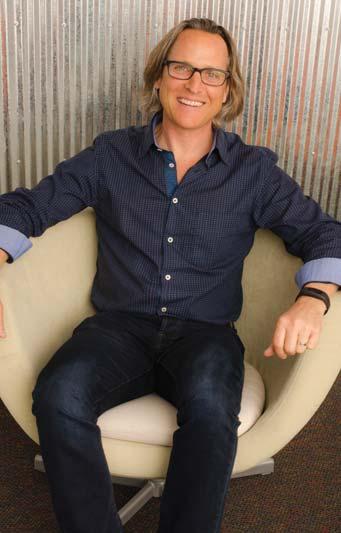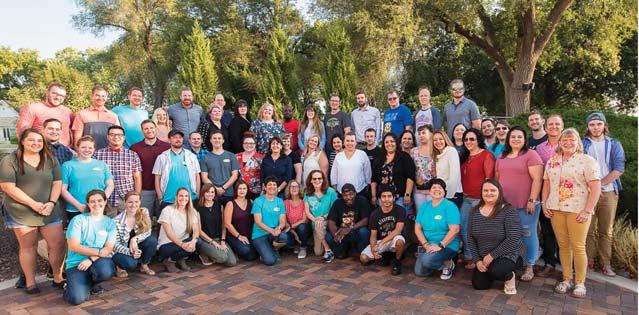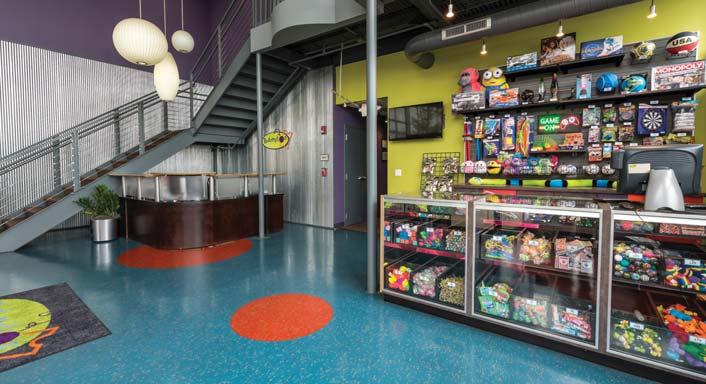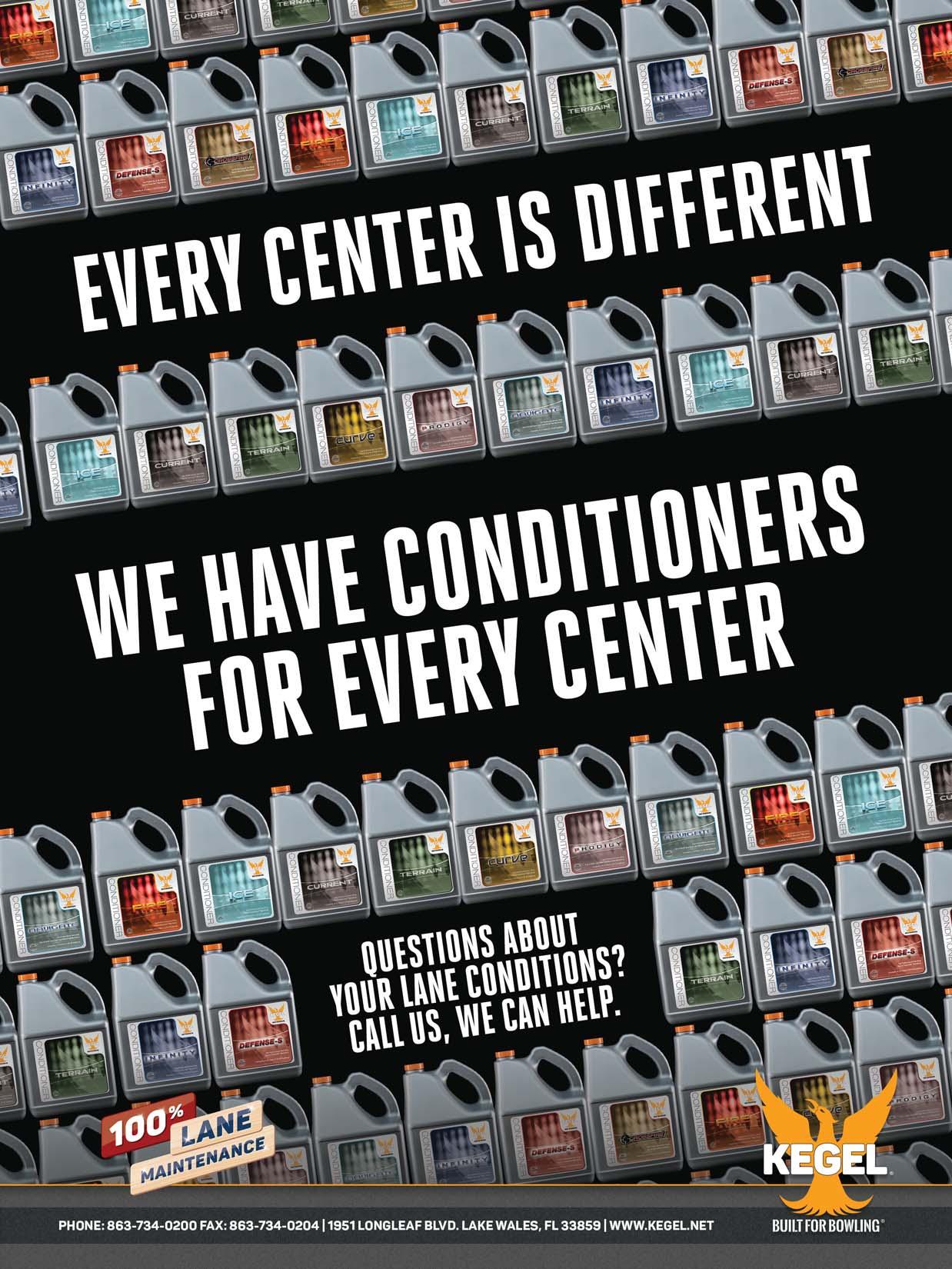
8 minute read
SHOWING UP BETTER
Ron Hill and his Redemption Plus team’s latest version of success – elevating humanity through business
By Fred Groh
Ron Hill, CEO of Redemption Plus, calls himself “a word guy.” He ticks off some words about feeling down and says he wouldn’t use any of them to describe how he felt during the years of self-identified “stagnation” at his company.
“When things aren’t working the way they [should], I don’t typically let that go. Were there times when I wondered whether we would figure it out? Yeah, but for the most part, in 23 years, we figured it out. Was there stress? Absolutely, but we’re pretty good at iterating.”
‘Redeem’ means taking back, recovering something of value. It’s important to know that, if you want to understand the way things turned out at Redemption Plus. “We figured it out pretty quickly. It just took us a number of years to align around purpose and people in our organization that had our core values.”
Once again, Hill and his team became innovators, at the same time re-dedicating themselves to three core values.
Into the Air
He remembers as a kid selling door to door “everything you could possibly sell,” from greeting cards to seeds. “I was always looking at the world and if something didn’t make sense to me, I tried to put it back together again in a way that made sense,” says the once and future entrepreneur.
After five years or so working at computer-training franchise in Seattle, he sold out

Ron Hill

and came home to Kansas City, looking for a fresh opportunity. He ran across the founder of a kids’ entertainment chain, Discovery Zone, that Hill describes as “tubes and cubes,” and from him got his first look at the fledgling FEC industry.
“At the same time I had a brother that was selling product at Sylvan Learning [tutoring] Centers. Sylvan has student stores very much like redemption centers. Kids come in and trade their tokens or ticket for product.”
The two concepts plus Hill’s computer background rhymed nicely.
In 1996, he and brother Brad Owen set up shop in their parents’ basement. They spent “a good six months” examining local FECs, trying to understand where there was opportunity to improve efficiency. “Fortunately, the opportunity was limitless,” he says.
“In the beginning most of our time was spent developing a software program that would be able to run a business. It was a way to curate our product—actually, we probably would have said [in those days] it was a way to build a product assortment—and a way for us to sell,” says the word guy with a computer history.
“From the beginning, we had this notion that people could be more efficient having a streamlined product source, being able to buy most everything you need from one vendor, and that we would then be able to deliver that to you with your retail information on it or your ticket amount. This was our first iteration on how we take part of what our customers do in their operations and simplify that for them.” That word again. By ‘iteration’ he means continual improvement.
Industry firsts came right along. Hill decided Redemption Plus would not have a catalog but instead everything would be posted on a website. “No one in our industry was using technology in that way,” he reports.
A second advance, about 2004, was called DPL, digital packing list. It saved Redemption Plus customers from having to manually update their redemption status data. Today, it’s conventional across the industry.
Around 2009, an idea for online redemption. Go into the game room, play the games, collect your tickets, cash them in for prizes online. You don’t have to wait at a redemption counter. “Not that it wasn’t a good idea but technology-wise I think people weren’t quite ready for that.”
But these are not really developments, says Hill. “I don’t feel like there’s a lot of tiny little steps [in the company’s history]. It’s iterating. Making what we’re doing, better.”

Redemption Plus's core values ensure a happy, successful business team
How did he judge these successes when they were brand new? “We’ve always been a company very focused on our relationship with the customer and not what is going on in the rest of the industry. So we at that time would probably have been looking at our own growth metrics, and back then it was sales.” But from that perspective, there was also the shadow of stagnation ahead.
Stalled
A couple of things happened, Hill recounts. “We had always been way ahead of the curve—technology, ideas—to the point where we just stopped because we felt we were way ahead of everybody. We just got complacent with our own growth internally and [that] part of the stagnation was just operational.”
And on the other side of the coin, “We’ve been very external, focused on the customer and how we make him more efficient. There was a point where it wasn’t necessarily efficient for us. There’s a point where you have to become super-efficient operationally and we kind of missed that internally.”
So Hill turned the company inward, “went internal to understand who we needed to be in order to deliver what the customer needed.
“We came around to understand what our purpose was, which was why we started the company. And [today] we align everything around a company purpose and core values. We can pull in what we need to fulfill the purpose that can innovate and drive efficiency at the same time.”
The purpose and the core values are as entrepreneurial as the mechanics of the business.
First Things First
“I get up every morning and think about how I can put you guys out of business,” a competitor once told Hill. He thought Redemption Plus’s core values ensure a happy, successful business team

The Conscious Capitalism graph explains the idea of elevating humanity through business


Redemption Plus’s Lenexa, KS, headquarters simulates a model redemption store.
that was “interesting,” because “I get up every morning and I think about how I can enrich the lives of my team and how we can make the world a better place.” He is being thoughtful, not saccharine. Hill is a strong advocate of “conscious capitalism,” a view of free enterprise as heroic. In the words of the Conscious Capitalism movement, “We believe that business is good because it creates value, it is ethical because it is based on voluntary exchange, it is noble because it can elevate our existence and it is heroic because it lifts people out of poverty and creates prosperity. Free enterprise capitalism is the most powerful system for social cooperation and human progress ever conceived.”
“Conscious capitalism is this idea of elevating humanity through business,” explains Hill. It’s about making profits and increasing shareholder wealth and building individuals and communities.
“The people that work on our fulfillment team are some of the most amazing and innovative people we have,” Hill says by way of illustration, “so we try to lift those people up. We pay them above a living wage and everybody in our organization is treated the same, treated fair and give an opportunity to live and grow. It’s about enriching lives, which is our purpose. I want people to be able to live a life beyond what they ever imagined they would be able to do. To me, this is what this is all about. That’s the piece I’m so passionate about.”
Not that he doesn’t want to make money. He wants to do both, he stresses. And among his tools for doing them are three core values.
Being “customer-centric” speaks for itself. And it’s usually talking about company focus or customer efficiency.
Why “a growth mindset”? Because the company is intent on “how we can show up in the world better each day. So a growth mindset for each individual and as a company.”
“Playfulness” is not just playing around in the office, although it seems that Redemption Plus staff enjoy their jobs. It’s like being a kid at heart. “Playfulness is about curiosity and understanding how the world works and how we can show up better for our customers. Kids are curious. I think when you’re playing a game you’re being a kid at heart. When we’re curious we understand the world better and we can create better solutions for our customers.”
In Flight Again
Looking inward, recovering and sharpening the core values, resuming the company’s arc of innovation and constant improvement, years 2015 through 2017 were spent on tough work to ignite Redemption Plus again. An industry first was proprietary packages that combine the company’s educational services. The packages won a Brass Ring at last year’s IAAPA show.
A website in development when we talked to Hill will have an indexing system that ranks merchandise items by performance, again proprietary. It will be both a service to Redemption Plus customers and a way to evolve the merchandise line.
“Storyboards” are pre-arranged merchandise layouts that a customer can choose.
The warehouse at the 80,000-square-foot Lenexa, KS, headquarters has been overhauled with a variety of proprietary systems to streamline fulfillment.
The design service creates custom redemption spaces.
Looking back over Redemption Plus’s 23 years, Hill says that from the very beginning, the company’s target has been improved efficiency for the customer. “Because that’s the unspoken need of the customer. It’s a complicated system. There’s typically teenagers working the redemption counter and it’s an area where they can have high turnover, so we want to take the headaches away from our customer. It’s what we’ve studied. On our side it’s fairly complicated; from the customer’s side, it should just feel simple and easy.”
By the ol’ reliable standard, too, Redemption Plus is a first-rate operation.
“It was a huge learning experience for me, to find out that probably the majority of the profitability of my company was inside, not about selling more but about how we become more efficient.” ❖
Fred Groh is a regular contributor to IBI and former managing editor of the magazine.






